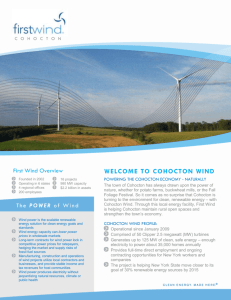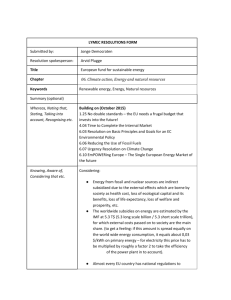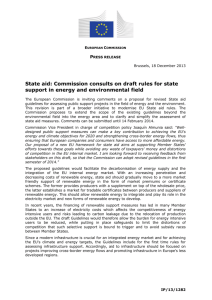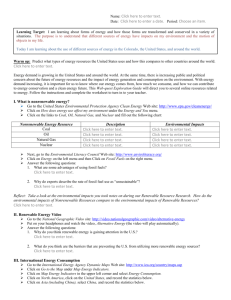Readings and assignments
advertisement
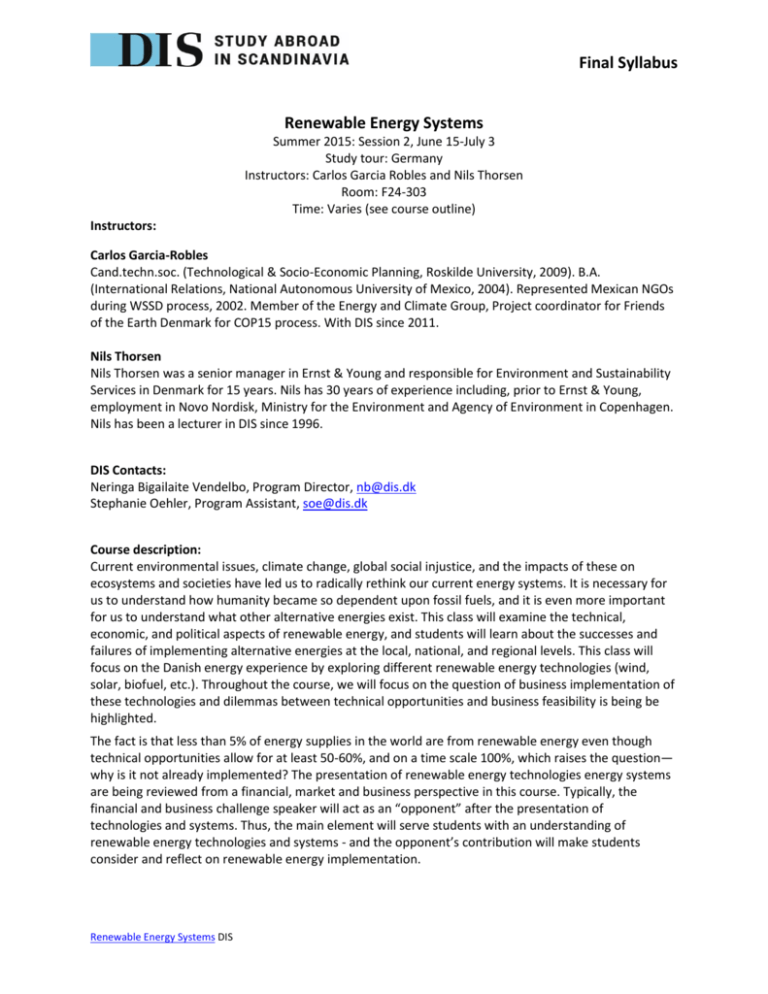
Final Syllabus Renewable Energy Systems Summer 2015: Session 2, June 15-July 3 Study tour: Germany Instructors: Carlos Garcia Robles and Nils Thorsen Room: F24-303 Time: Varies (see course outline) Instructors: Carlos Garcia-Robles Cand.techn.soc. (Technological & Socio-Economic Planning, Roskilde University, 2009). B.A. (International Relations, National Autonomous University of Mexico, 2004). Represented Mexican NGOs during WSSD process, 2002. Member of the Energy and Climate Group, Project coordinator for Friends of the Earth Denmark for COP15 process. With DIS since 2011. Nils Thorsen Nils Thorsen was a senior manager in Ernst & Young and responsible for Environment and Sustainability Services in Denmark for 15 years. Nils has 30 years of experience including, prior to Ernst & Young, employment in Novo Nordisk, Ministry for the Environment and Agency of Environment in Copenhagen. Nils has been a lecturer in DIS since 1996. DIS Contacts: Neringa Bigailaite Vendelbo, Program Director, nb@dis.dk Stephanie Oehler, Program Assistant, soe@dis.dk Course description: Current environmental issues, climate change, global social injustice, and the impacts of these on ecosystems and societies have led us to radically rethink our current energy systems. It is necessary for us to understand how humanity became so dependent upon fossil fuels, and it is even more important for us to understand what other alternative energies exist. This class will examine the technical, economic, and political aspects of renewable energy, and students will learn about the successes and failures of implementing alternative energies at the local, national, and regional levels. This class will focus on the Danish energy experience by exploring different renewable energy technologies (wind, solar, biofuel, etc.). Throughout the course, we will focus on the question of business implementation of these technologies and dilemmas between technical opportunities and business feasibility is being be highlighted. The fact is that less than 5% of energy supplies in the world are from renewable energy even though technical opportunities allow for at least 50-60%, and on a time scale 100%, which raises the question— why is it not already implemented? The presentation of renewable energy technologies energy systems are being reviewed from a financial, market and business perspective in this course. Typically, the financial and business challenge speaker will act as an “opponent” after the presentation of technologies and systems. Thus, the main element will serve students with an understanding of renewable energy technologies and systems - and the opponent’s contribution will make students consider and reflect on renewable energy implementation. Renewable Energy Systems DIS Final Syllabus Energy models for systematic supply with renewable energy will be presented and students will build their own supply model thorough a game. The course covers the model that currently works in Denmark, which forms the basis for a dialogue on dilemmas between opportunities and barriers for a wider dissemination of renewable energy. We will also focus on a business perspective to various clean technologies, policy options to promote these and business feasibility. The core of the course will be a discussion between technological opportunities and societal, political, business and market drivers. Format: The course is taught through a mixture of lectures, specific assignments, group work and discussions. Guest speakers, field studies, and a study tour will also be incorporated and are important parts of the learning process. This session incorporates a one-week study tour to Germany. The study tour will be a mixture of academic and cultural visits and activities. The course elements are: Lectures, including students preparation and contribution to discussion of the readings and faculty’s input Assignments related to supply, market and negation games Field studies and guest speakers Study tour to Germany Date/Times 1 Reading Interview links on Blackboard Tuesday, June 16 14:00 – 15:00 2 Topic -Introduction to course (Carlos + Nils) -Organization of logistics – group work, grading criteria readings etc. Students to edit there background, priorities, expectations for the course etc. 15:00 – 16:15 -Presentation of logistical information for study tour (Stephanie and Sofie) 16:30 – 17:00 COP 21 status (Nils and Carlos) 2 Blackboard Videos Reinventing Fire Executive Summary Wednesday, June 17 9:00 – 12:30 Presentation of Renewable Technology Opportunities: -Wind parts 1 and 2 (Carlos) -Danish Windmill Story (Carlos) Business and actor involvement (Nils) Renewable Energy Systems DIS Renewable Energy A Users Guide pp 106-133 Look at Danish Wind Energy Market Flash Player Peter Karnøe: RES - Path Final Syllabus 14:00-18:00 3 Field Study to Lynetten Windpower (Carlos) creation dynamics and winds of change a RES frontrunnerils Thorsen: Business perspectives, Wind, review note Wave energy (Julia) Renewable Energy A Users Guide and 8 pp 154 Thursday, June 18 9:00-10:20 10:40- 12:00 Geothermal (Carlos) Venture Capital Firms in the Clean Energy Sector: The Unites States Experience by Sanjay Jain, Santa Clara University, April 9 2013 6 Myths About Venture Capitalists by Diane Mulcahy, Harvard Business Review, May 13 2013 4 Friday, June 19 9:00 – 10:20 Biofuels and biomass basics (Carlos) Review: Business drivers and barriers, including EU plan for biofuels (Nils) 10:40 – 12:00 Solar thermal and solar PV (Carlos) Review: Business drivers and barriers (Nils) 13:00-13:30 Solar videos (Carlos) 13:40 -15:30 Introduction to games (Carlos) Preparation for games (Carlos) 1) Changing the game part 1 (energy supply) 2) Changing the game 2 (negotiation) 3) ENSIGHT (Electricity markets) (Julia) Renewable Energy Systems DIS Renewable Energy A Users Guide Chapters 2 pp 28-41 Chapter 4 Biofuels Pp 76-89 and chapter 6 PV pp 133 Nils Thorsen, Review note: Business perspectives for solar energy and biofuels Background material for changing the game ENSIGHT debriefing manual Final Syllabus Study Tour: Germany 5 Monday, June 29 Readings on Black Board 09:00 – 9:20 Study tour wrap-up. 9:20 – 10:40 Combined Heat and Power (CHP) and District Heating (Carlos) Review – Business drivers and barriers (Nils) 10:50 – 12:00 6 Wind, Solar, Biomass, Policy Instruments, Urban (Re)Development Energy Plans in Denmark (Nils and Carlos) Video: CHP District heating & cooling from Denmark Video: Biomass in Denmark Lund Chapter 5 Energy Strategy 2050, Danish Governmental Commission, pp 3-10 14:00 – 17:00 Field Study to Amager Resource Center Tuesday, July 30 Game Day! Changing the Game manual 9:00-13:00 Changing the Game part 1: energy supply. Change the energy future of Europe using changing cards and Lego bricks. (Julia +1) Chapter 5 Reinventing Fire pp166-187 (Preparation for class on July 3) **Paper on Changing the game part 1 due** 7 Wednesday, July 1 9:00 – 10:20 Future investment strategies and other financial mechanisms Lenas paper (to be specified) Feed-in Tariffs in America Electricity markets (Guest: Lena) The electrical system and a tandem Bicycle 10:40 – 12:00 13:00 – 14:20 Renewable Energy; making things fit together (Carlos) Chapter 5 Reinventing Fire pp188-225 Video: America´s New Energy System Video: Smart Grid in Denmark Renewable Energy Systems DIS Final Syllabus 8 Thursday, July 2 9:00 – 13:00 14:00 - 15:00 Readings on Black Board ENSIGHT – Electricity markets game (Julia +1) Preparation for negotiation game on July 3rd (Carlos) ENSIGHT debriefing manual 4 short videos on Energy Markets in Scandinavia (to be viewed before the class) **Paper on ENSIGHT Electricity markets game due** 9 Friday, July 3 **Paper Negotiation game due** 9:00 – 12:00 Changing the Game part 2: Energy negotiation game (Julia, Nils, Carlos) 12:00 – 13:30 Course wrap up including student to recap their note on expectation, priorities etc. Program concluding lunch Assignments and grading elements (you will receive written instructions in class regarding individual assignment details): Assignment 1: Students choose readings for specific preparation and edit a note (1 pg.) presenting essence of the reading and key questions to open the floor for discussion in class 15% Assignment 2: Interpretation note regarding Change the game part 1 – Energy supply 20% Assignment 3: Interpretation note regarding ENSIGHT - of energy markets 20% Assignment 4: Interpretation note Changing the games part 2 Negotiation play 20% DEADLINE BEFORE GAMES EXECUTION Assignment 5: Individual presentation on reading/visit: 10% Class and study tour participation: 15% Assignment guides will be provided. OBS: All written assignments e-docs sent to instructors must have the following name: Student first name.students last name.assignment number Ex: Nils.Thorsen.assignment 1.docx Primary Texts: McCrea, Andy: Renewable Energy, A Users Guide. (available on Blackboard) Renewable Energy Systems DIS Final Syllabus Lovins, Amory: Reinventing Fire: Bold Business Solutions for the New Energy Era. (available on Blackboard) Lund, Henrik (2010): Renewable Energy Systems: The Choice and Modeling of 100% Renewable Solutions. Elsevier. (to be picked up from library) Readings, articles, videos and excerpts uploaded to Blackboard All readings that are not found in the main textbook are on Blackboard! Participation includes the following criteria: Attendance Active participation in class and study tour discussions Preparation for each class Reading all assigned texts Preparing all assignments for class Reflection on reading Active participation in field studies and study tour visits Attendance: You are expected to attend all DIS classes when scheduled. If you miss two classes, the Director of Teaching and Learning, and the Director of Student Affairs will be notified; they will followup with you to make sure that all is well. Absences will jeopardize your grade and your standing at DIS. Allowances will be made in cases of illness, but you will need to provide a doctor’s note. Deadline policy: Assignments and papers handed in after the deadline are not accepted and will be graded as failed. If you’re ill (and can provide a valid doctor’s note) or have good reasons for not being able to meet a deadline, make sure to consult the instructor. Confidentiality: Due to the nature of some of our visits throughout the semester, you may be asked to sign a confidentiality agreement with regards to privacy of some Cleantech knowledge. In the event that a company requires you to keep information confidential, please be advised that information regarded as confidential will not be allowed to be posted on DIS forum, made available on the internet, or distributed to 3rd parties. DIS Forum: To log onto the DIS Forum website for the first time, go to forum.dis.dk. Please refer to the “Welcome to DIS Forum” email you received before your arrival in Copenhagen. Otherwise, enter the email address that you provided to DIS, as this is now your username. Click “forgot password’’ and the password will be sent to your email account. Use the password to log on and then Renewable Energy Systems DIS Final Syllabus you can change your password under “my info.” If you are having problems please contact forumhelp@dis.dk. Transportation: The best way to find your way around Copenhagen and the greater Copenhagen area is to use www.rejseplanen.dk Click on the British flag for English, type in your starting and finishing addresses, and either the time you want to leave or arrive. This website will show you various routes to get to your destination, when you should leave, the amount of time it takes, the zones required and the type of public transportation that will be used. Your transportation pass is valid on all S-trains, metros, busses, and regional trains ONLY in the zones you have been given (if you have received a transportation pass.) All group transportation for field studies will be covered by DIS, but bring your transportation pass if you have received one from DIS. Another useful tool for walking or biking directions is Google maps and the Danish equivalent: www.krak.dk Laptop computer policy: While most students find that taking notes by hand in class is quite sufficient for review purposes, you are allowed to use a computer in class for writing lecture/discussion notes. However, you are asked not to use computers in class to write e-mails, connect to social media, or conduct other such activities as this is quite disrespectful and distracting for me and other students. Failure to show this courtesy will result in a reduction of your class participation grade. Academic Honesty: Plagiarism and Violating the Rules of an Assignment DIS expects that students abide by the highest standards of intellectual honesty in all academic work. DIS assumes that all students do their own work and credit all work or thought taken from others. Academic dishonesty will result in a final course grade of “F” and can result in dismissal and notification of the students’ home universities. DIS reserves the right to request that written student assignments be submitted in electronic form for submission to plagiarism detection software. See the Academic Handbook for more information, or ask your instructor if you have questions. Disability resources: Any student who has a need for disability accommodations should contact Sean Green (sgr@dis.dk) to coordinate this. Upon DIS approval, students should inform the instructor of accommodations within the first 2 weeks of class. Renewable Energy Systems DIS

